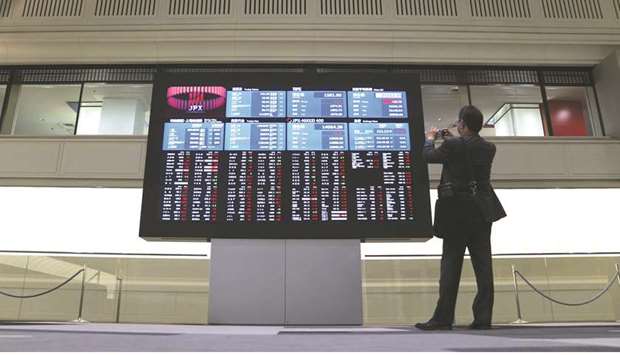Asian markets mostly fell yesterday as investors bide their time until the Federal Reserve’s latest policy meeting, while the pound fought back against the dollar after taking a hit from the latest twist in the Brexit saga.
With little fresh information on developments in China-US trade talks, focus has turned this week to the US central bank and its interest rate plans.
Board members are widely expected to hold fire on another hike but its post-meeting statement today will be pored over, with observers predicting the Fed will opt for just one increase this year as opposed to the two previously tipped, owing to the stuttering economy.
The Fed’s softer tone has been one of the key factors in a global stocks rally this year, with investors buoyed by the prospect of cheap borrowing.
Wall Street provided a positive lead with all three main indexes ending higher, though Asia struggled to take up the baton.
Shanghai closed 0.2% lower at 3,090.98 and Tokyo ended 0.1% weaker at 21,566.85. Sydney, Singapore and Seoul were each 0.1% off, while Wellington, Manila and Taipei were also slightly down. But Hong Kong recovered from an early sell-off to end slightly higher, extending a winning run to four days.
The pound was slowly edging back up against the dollar after taking a hit from fresh Brexit uncertainty sparked by Prime Minister Theresa May being told she would not be allowed to hold another vote on her exit deal.
Speaker of the House of Commons John Bercow used a centuries-old rule that said the government could not submit its Brexit deal for another vote in parliament if it is “the same” or “substantially the same” to the one already rejected by MPs. The decision means May must come up with a revised plan just two weeks before the key March 29 deadline for leaving, having already been told by EU leaders they will not budge any further.
“Given the EU’s stand seems to be that negotiations have finished on the withdrawal agreement, if that’s right then time’s up, and so the odds of May’s soft Brexit plan being approved now have fallen dramatically,” said David de Garis, director of economics and markets at National Australia Bank.
May had been due to hold another vote this week on the pact.
If it had passed, she would have sought a short extension to Brexit but if it had failed, some reports said the divorce could have been put off for up to two more years.
Analysts said the latest news has left many scratching their heads.
Even with “all of this added uncertainty, the pound managed to hold up fairly well, despite sliding back on the day, presumably because markets think that when it comes down to it MPs will finally act and pullback from the precipice of ‘no deal’”, said Michael Hewson, chief market analyst at CMC Markets.
And there was also some optimism that the sterling could rattle a lot higher, with Huw Davies at Merian Global Investors telling Bloomberg News that the unit is currently cheap and it could shoot to as high as $1.40 or $1.45 once there is some clarity over Britain’s
future.

Asia
